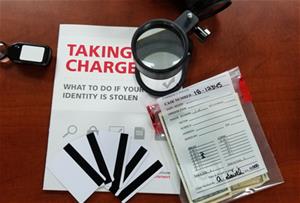
The Leon County Sheriff's Office Financial Crimes Unit is dedicated to the detection and apprehension of fraud related crimes against the citizens of Leon County. These crimes include embezzlement, bank fraud, scams, credit card fraud, computer fraud, financial exploitation of the elderly/disabled and other white collar crimes. The Financial Crime Unit also conducts forensic analysis on computers and related peripherals. The unit is active in the North Florida Cyber Crimes Task Force and Infraguard. The Cyber Crimes Task Force is a joint effort of Local, State, and Federal agencies in combating crime perpetrated using the Internet. Infraguard is a joint effort between government agencies and the public in cybercrime detection, investigation, and prevention. The Financial Crimes Unit also participates in the Fraud-Net e-mail alert system which is sponsored by the Florida Bankers Association. The system allows detectives to share information and intelligence, crucial suspect data, and photographs with other investigators from 21 states and Puerto Rico.
The Financial Crimes Unit works jointly with the Big Bend Fraud & Forgery Task Force which consists of representatives from financial institutions, law enforcement and corporate/retail security who meet once a month to discuss incidents occurring in our area to prevent future acts of fraud.
Several detectives assigned to the unit are Certified Fraud Examiners (CFE). The Association of Certified Fraud Examiners is a professional organization which certifies financial crimes investigators from the public and private sector. The course includes over 50 hours of study material and a four part examination consisting of 600 questions. The Financial Crimes Unit participates in the Tallahassee CFE Chapter.
The Leon County Sheriff's Office Financial Crimes Unit is dedicated to the detection and apprehension of criminals who commit fraud against the citizens of Leon County.
Big Bend Fraud and Forgery Task Force
The Big Bend Fraud and Forgery Task Force is a group of professional people and organizations formed as the result of the rising number of economic crimes perpetrated against the business and banking communities of the Big Bend area. Due to the sophisticated nature of many of these crimes, law enforcement, banking and the business community needed a way to exchange information, explain the problems faced by each member and reduce the economic loss suffered by business and banking as well as ensuring successful criminal prosecution.
The Big Bend Fraud and Forgery Task Force members usually meet on the second Tuesday of every month. These meetings assist the Big Bend Fraud and Forgery Task Force in developing and maintaining ties between financial, retail, corporate security, law enforcement and the judiciary. Membership is open to anyone fulfilling membership qualifications, among which is employment in one of the fields of banking, retail, corporate security, law enforcement or the judiciary.
There is a $50 annual fee for membership, per organization. Meeting attendance is then open to each of the member's employees. The Big Bend Fraud and Forgery Task Force invites you to become a member.
For more information about the Task Force contact Beth Parramore, Secretary/Treasurer via e-mail at bparramore@fmbbank.com.
Scams and Phishing
- "We suspect an unauthorized transaction on your account. To ensure that your account is not compromised, please click the link below and confirm your identity."
- "During our regular verification of accounts, we couldn’t verify your information. Please click here to update and verify your information."
Have you received email with a similar message? It’s a scam called “phishing” — and it involves Internet fraudsters who send spam or pop-up messages to lure personal information (credit card numbers, bank account information, Social Security number, passwords, or other sensitive information) from unsuspecting victims.
According to the Federal Trade Commission (FTC), the nation’s consumer protection agency, phishers send an email or pop-up message that claims to be from a business or organization that you may deal with (for example, an Internet service provider (ISP), bank, online payment service, or even a government agency). The message may ask you to “update,” “validate,” or “confirm” your account information. Some phishing emails threaten a dire consequence if you don’t respond. The messages direct you to a website that looks just like a legitimate organization’s site. But it isn’t. It’s a bogus site whose sole purpose is to trick you into divulging your personal information so the operators can steal your identity and run up bills or commit crimes in your name.
The FTC suggests these tips to help you avoid getting hooked by a phishing scam:
- If you get an email or pop-up message that asks for personal or financial information, do not reply. And don’t click on the link in the message, either.
- Use anti-virus software and a firewall, and keep them up to date.
- Don't email personal or financial information.
- Review credit card and bank account statements as soon as you receive them to check for unauthorized charges.
- Be cautious about opening any attachment or downloading any files from emails you receive, regardless of who sent them.
- Forward spam that is phishing for information to spam@uce.gov and to the company, bank, or organization impersonated in the phishing email.
- If you believe you’ve been scammed, file your complaint at www.ftc.gov, and then visit the FTC's Identity Theft website at www.consumer.gov/idtheft.
You can learn other ways to avoid email scams and deal with deceptive spam at www.ftc.gov/spam.
You can also visit the F.B.I.'s site on consumer fraud at www.fbi.gov/majcases/fraud/fraudschemes.htm.
Fraud Alert Packet
Credit Card Fraud
 Credit card fraud costs credit card companies and holders roughly 1.5 billion dollars a year. This is such a lucrative form of crime that some drug dealers have stopped dealing and have gone into the credit card racket. There are numerous forms of credit card fraud that can be committed by thieves, legitimate card holders and even business owners.
Credit card fraud costs credit card companies and holders roughly 1.5 billion dollars a year. This is such a lucrative form of crime that some drug dealers have stopped dealing and have gone into the credit card racket. There are numerous forms of credit card fraud that can be committed by thieves, legitimate card holders and even business owners.
Lost or stolen credit cards make up half of the losses incurred by credit card companies each year. The greatest number of stolen cards are taken from the card holders vehicles. Following closely in second place is the theft of credit cards in the workplace.
Not Received Items (NRI) are new or replacement cards that have been mailed to the proper individual, but have been claimed as not received. Cards can be stolen anywhere from the card issuer to the persons mailbox. Several security measures used to battle NRI incurred losses are duel dating, card activation and alternative delivery. Dual dating only allows the card to be activated one month after it has been mailed. This gives the cardholder time to report non-delivery of the card. Card activation requires the card holder to activate the card through a phone call before it can be used. To avoid high loss mail centers, alternative delivery is used. Private shipping companies are used with secure facilities to ensure no employee theft.
Fraudulent application is the use of information misrepresentation to obtain a bank card. The use of a true name with a false address is a common form of fraudulent application.
Counterfeit and altered credit cards are another form of credit card fraud. Counterfeit cards are those that are illegally manufactured by persons other than an issuing bank. Altered cards are genuine cards that have had it's properties changed by mechanical or electronic means. Embossed numbers can be flattened allowing reprinting and magnetic strips can be re-encoded to match or not to match the new number on the front.
Unauthorized use or no card present fraud are some of the easiest types of credit card fraud to commit. These crimes are known as "moto" crimes, standing for "money order telephone order". This is the ordering of merchandise in which the merchant only gets a credit card number and never verifies the validity of the card or looks at a signature.
Since credit card fraud is prevalent in today's society we must take steps to secure our credit cards. Treat credit cards as you would handle currency of the same value. Keep in mind a credit card with a $5000.00 limit could be used in the same manner as $5000.00 cash. Also remember losses by credit card companies are passed from the credit card companies to the consumer.